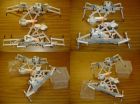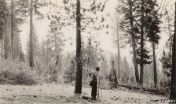Louisiana Tech University professor visits India as part of US delegation on energy issues
2011-01-21
(Press-News.org) RUSTON, La. – While most people were busy shopping during the holiday season, Dr. Daniela Mainardi, associate professor of chemical engineering at Louisiana Tech University and member of the Institute for Micromanufacturing, was preparing for a trip that would take her half way around the world.
As part of a joint effort, Mainardi, together with Virendra Mathur from the University of New Hampshire, and Suddhasatwa Basu and Shantanu Roy from The Indian Institute of Technology-Delhi, was in charge of organizing a workshop titled, "Energy and Environment: Challenges and Research Opportunities" for The Claridges, SurajKund in Delhi, India this past December.
The purpose of the workshop was to have an exchange of scientific information and a dialogue between American and Indian university faculty members. The interaction was supported by the Indo-US Science and Technology Forum, The Indian Institute of Technology, and the National Science Foundation through a grant on which Mainardi is a Co-Principal Investigator.
"This joint workshop provides a platform to achieve these objectives of information exchange and faculty collaboration that may have a major impact on the critical problems facing the world today," said Mainardi. "The major result of this workshop would be the continuation of the sustained collaborative R&D efforts between faculty members of the two nations to undertake fundamental research in the areas of energy and pollution control."
"Another objective of the workshop was to facilitate contacts between chemical engineering academics in India and the U.S. in order that some collaborative efforts might ensue in the future from this workshop."
The workshop was attended by 28 chemical engineers – 14 from U.S. and 14 from India. The U.S. delegation was carefully selected and consisted of 14 professors at the full and associate professor levels from different American institutions. Two others attendees from Louisiana, apart from Mainardi, were Vijay John, chair of the chemical and biomolecular engineering department at Tulane University, and Kaliyat Valsaraj, chair of the chemical engineering department at LSU.
The India delegation consisted of professors from diverse selection of Indian institutions, such as the Indian Institute of Science, the Indian Institute of Technology, and the Calcutta University.
After oral presentations were given by each attendee, the group benefited from breakout sessions to identify clear areas for collaboration.
"Knowing everyone's research accomplishments helped visualize how we could all benefit from each other's strengths," Mainardi said. "The workshop highlighted the potential of collaborative work to enhance the tools for Energy and Environment and proposed several avenues for future research."
###
END
ELSE PRESS RELEASES FROM THIS DATE:
2011-01-21
WASHINGTON, Jan. 20, 2011 — The latest episode in the American Chemical Society's (ACS) award-winning podcast series, "Global Challenges/Chemistry Solutions," focuses on development of a new ultra-light biodegradable foam plastic material made from two unlikely ingredients: The protein in milk and ordinary clay.
The material could be used in numerous products, researchers report in the ACS' Biomacromolecules, a monthly journal. The finding comes amid ongoing concern about plastic waste accumulating in municipal landfills, and reliance on imported oil to make plastics.
David ...
2011-01-21
LA JOLLA, CA – January 20, 2011 – Scientists at The Scripps Research Institute have found that a known enzyme in cells protects against measles virus, likely by altering the virus's genetic material, RNA. Cells lacking the enzyme become highly vulnerable to the virus's destructive effects. The enzyme also protects against several other respiratory viruses, including influenza A.
"We believe that host cells use this RNA-editing enzyme to slow these viruses' ability to replicate," said Michael B. A. Oldstone, the study's senior author and a professor at Scripps Research's ...
2011-01-21
Stanford, CA— Genghis Khan and his Mongol hordes had an impact on the global carbon cycle as big as today's annual demand for gasoline. The Black Death, on the other hand, came and went too quickly for it to cause much of a blip in the global carbon budget. Dwarfing both of these events, however, has been the historical trend towards increasing deforestation, which over centuries has released vast amounts of carbon dioxide into the atmosphere, as crop and pasture lands expanded to feed growing human populations. Even Genghis Kahn couldn't stop it for long.
"It's a common ...
2011-01-21
WASHINGTON, Jan. 20 – The eyes of moths, which allow them to see well at night, are also covered with a water-repellent, antireflective coating that makes their eyes among the least reflective surfaces in nature and helps them hide from predators in the dark. Mimicking the moth eye's microstructure, a team of researchers in Japan has created a new film, suitable for mass-production, for covering solar cells that can cut down on the amount of reflected light and help capture more power from the sun.
In a paper appearing in Energy Express (www.OpticsInfoBase.org/ee), a ...
2011-01-21
VIDEO:
A two-minute video, "Morphological Change in Machines Accelerates the Evolution of Robust Behavior, " was produced by the Morphology, Evolution and Cognition Laboratory, University of Vermont, 2011.
Click here for more information.
Want to build a really tough robot? Forget about Terminator. Instead, watch a tadpole turn into a frog.
Or at least that's not too far off from what University of Vermont roboticist Josh Bongard has discovered, as he reports ...
2011-01-21
AURORA, Colo. (Jan. 20, 2011)--Cancer scientists have designed the first molecular test to predict which bladder cancer patients may have cancer involvement in their lymph nodes at the time of surgery—which could help doctors determine which patients are good candidates for pre-surgical, or neo-adjuvant, chemotherapy.
The test analyzes 20 genes on tumor biopsies, according to a paper published online Jan. 20, 2011, in Lancet Oncology.
"Randomized clinical trials have shown that giving neo-adjuvant chemotherapy extends patient lives, but only 5 to 15 percent of patients ...
2011-01-21
In a paper published today in the journal Science, a University of California, Davis, researcher and his co-authors challenge a widely held assumption that plants will move uphill in response to warmer temperatures.
Between 1930 and 2000, instead of colonizing higher elevations to maintain a constant temperature, many California plant species instead moved downhill an average of 260 feet, said Jonathan Greenberg, an assistant project scientist at the UC Davis Center for Spatial Technologies and Remote Sensing.
"While the climate warmed significantly in this period, ...
2011-01-21
With little more than a conventional photocopier and transparency film, anyone can build a functional microfluidic chip.
A local Cambridge high school physics teacher invented the process; now, thanks to a new undergraduate teaching lab at Harvard's School of Engineering and Applied Sciences (SEAS), students will be able explore microfluidics and its applications.
The Microfluidics Lab, developed by Dr. Anas Chalah, Director of Instructional Technology at SEAS, takes advantage of a simple but ingenious new method of creating lab-on-a-chip devices that are quick to produce, ...
2011-01-21
DETROIT—Wayne State University researchers have found that when patients and providers speak the same language, patients report less confusion and better health care quality. The findings were based on data from the Pew Hispanic Center/Robert Wood Johnson Foundation's Latino Health Survey.
Understanding the relationship between language and health care quality has important public health implications for providing services in an increasingly diverse U.S. population, according to Hector M. González, Ph.D., assistant professor of family medicine and public health at WSU's ...
2011-01-21
Breast cancer patients who have a strong social support system in the first year after diagnosis are less likely to die or have a recurrence of cancer, according to new research from Vanderbilt-Ingram Cancer Center (VICC) and the Shanghai Institute of Preventive Medicine. The study, led by first author Meira Epplein, Ph.D., assistant professor of Medicine at VICC, was published in a recent edition of the Journal of Clinical Oncology.
Patients in the study were enrolled in the Shanghai Breast Cancer Survivor Study, a large, population-based review of female breast cancer ...
LAST 30 PRESS RELEASES:
[Press-News.org] Louisiana Tech University professor visits India as part of US delegation on energy issues


